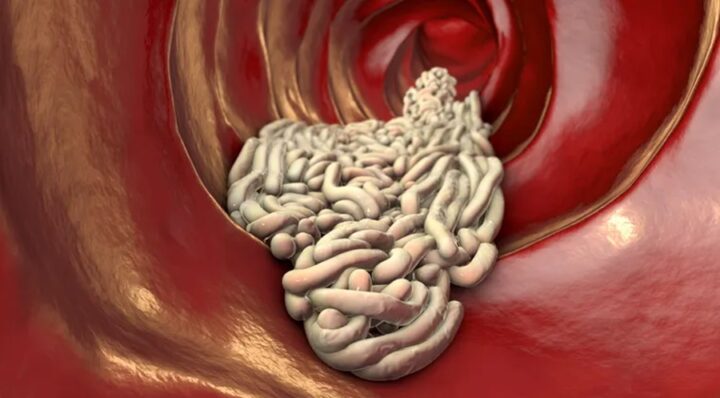
Treating pinworms – these remedies help
Means that fight pinworms help against pinworms. Read what to look out for when taking it and what role hygiene plays in the treatment. / Treating pinworms – these remedies help
In many cases, a pinworm infestation in a child or in the whole family can be effectively treated with anthelmintics. Nevertheless, without additional measures, it is not unlikely to be infected again. In order for pinworms to disappear, it is therefore important to take the medication as instructed on the one hand and to pay attention to increased hygiene on the other.
Good to know
Pinworms are particularly common in children of kindergarten or primary school age, but can also affect adults. A typical symptom is a strong nocturnal itching in the anal area – this is where the worms lay their eggs in the skin folds at night. However, an infestation is only accompanied by noticeable symptoms in about two-thirds of cases. The sticky worm eggs stick well to hands and objects, making them easy to spread to others.
If the doctor detects pinworms in a child or adult, it is very likely that others in the family or close contacts are also infected. Since not all infected people develop symptoms, a pinworm infestation can also go unnoticed, but contribute to the spread of the worm eggs and to renewed infections. Then it can happen that pinworms just don’t seem to want to go away.
Treating pinworms: These medications will help
Prescription and over-the-counter medications are available to treat pinworms in children or adults. These are primarily anthelmintics with the active ingredients mebendazole, pyrantel or pyrvinium. A pinworm infestation during pregnancy or breastfeeding can also be treated with medication (with medical supervision).
While drugs containing mebendazole and pyrantel require a prescription, drugs containing pyrvinium are available over the counter at pharmacies. However, pyrvinium is less effective against pinworms than other active ingredients and is therefore only suitable for treatment to a limited extent.
However, before self-treatment with over-the-counter pyrvinium preparations or the use of such substances in children if pinworms are suspected, it is always advisable to consult a doctor. Mebendazole is usually the drug of choice for doctors because it is effective against both adult pinworms and their eggs. Pyrantel and Pyrvinium, on the other hand, only fight adult pinworms.
Medicines against pinworms are available in various dosage forms – such as tablets, dragees, chewable tablets or juice – and are usually well tolerated. The intake is similar for all active ingredients: A single intake or an intake over a few days is usually sufficient, which then has to be repeated after two and sometimes four weeks, depending on the active ingredient.
Repeated dosing at regular intervals is important to get rid of pinworms completely and should be strictly observed. This is the only way to catch pinworms that have in the meantime developed in the intestine as a result of accidental self-infection or re-infection.
In the case of a stubborn pinworm infestation, it may be advisable to treat the entire family – and possibly also other close contacts, such as close (play) friends, roommates, sexual partners – with the wormer over a longer period of time: It is recommended a single dose of mebendazole approximately every two weeks for a total of 16 weeks.
Treating pinworms: heed hygiene tips
In addition to medication, hygiene also plays an important role in a pinworm infestation. It is intended to prevent the sticky worm eggs from spreading further and leading to new infections.
Good hand hygiene is particularly important. This means washing your hands regularly with soap and water after going to the toilet (especially after having a bowel movement) or after changing diapers and before eating. The fingernails should also be kept short and cleaned with a nail brush when washing your hands.
In order to get rid of pinworms safely, it is also advisable to pay attention to the following hygiene tips in addition to drug treatment:
If possible, do not scratch the anal area – with small children this often happens unnoticed while they are sleeping. If you can’t avoid it, wash your hands afterwards. For smaller children, cotton gloves may be advisable at night to prevent worm eggs from getting under their fingernails.
Wash the buttocks and anal area or intimate area daily after waking up (washing “from front to back”); If the infestation affects children, do not bathe together for the time being.
Put on fresh underwear daily; Change pajamas regularly.
Do not put your fingers in your mouth, avoid sucking your thumb or fingers, or biting your nails.
Change beds more frequently and wash used bedclothes immediately after removing them; change the bed linen, especially in the days after taking the wormer.
Do not share towels and washcloths.
Wash close-fitting laundry such as underwear or pajamas at 60 to 95 degrees Celsius, as well as towels, washcloths, bed linen and, if necessary, cuddly toys.
Do not fluff up the bedding for the time being so as not to spread worm eggs.
Rinse toys or other objects to which worm eggs may adhere under hot running water with soap; alternatively place in the dishwasher or washing machine.
Clean door handles regularly, as well as toilet and surfaces in bathrooms; vacuum in bedrooms.
Pinworms: hand hygiene after treatment
In order to keep the risk of a renewed pinworm infestation low, affected adults and children should continue to practice good hand hygiene even after treatment. It is important to continue to wash your hands more frequently with soap and water – especially after going to the toilet (and after changing diapers) and before eating. Children should also (as far as possible) not put their fingers in their mouths. Good hand hygiene not only reduces the risk of pinworms, but can also protect against respiratory and gastrointestinal infections.
House dust mite allergy symptoms
These symptoms can herald kidney failure
Categories: General
